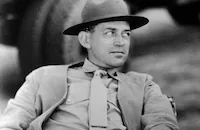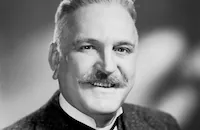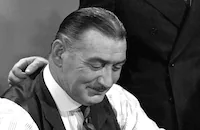Naughty Marietta

Brief Synopsis
Cast & Crew
W. S. Van Dyke
Jeanette Macdonald
Nelson Eddy
Frank Morgan
Elsa Lanchester
Douglas Dumbrille
Film Details
Technical Specs

Synopsis
In 18th century France, French princess Marie de Namours de la Bonfain, an orphan who lives with her uncle, Prince de la Bonfain, refuses to marry Spanish grandee Don Carlos de Braganza. Although the marriage has been sanctioned by King Louis XV, Marie tells her confidant, Herr Schuman, that she prefers to marry a man who will be "tall and strong in the wind." She calls Don Carlos, who has come from Madrid to take her to Spain with him, an "odious" man. Marie disregards her uncle's warning about the dire consequences that will befall her if she refuses to obey the king's wishes, and decides to escape from France when she learns that her maid, Marietta Franini, is departing for Louisiana. After Marietta tells Marie that she is leaving for the colonies because she is too poor to stay in Paris and marry her sweetheart Giovanni, Marie offers her money in exchange for permission to take her place aboard the ship. Marietta accepts the offer, and Marie, disguised as Marietta, boards the ship in her stead. Soon after the princess' departure, a public notice is posted proclaiming that she is a fugitive, and a reward of 550 Louis D'ors is offered for information on her whereabouts. On the ship, the princess takes her place among the many casquette girls, who are sailing to Louisiana to fulfill their contract with the king and marry colonists in New Orleans, and tells Julie, one of the girls, that she will not do what is expected of her upon their arrival. Following an attack on the ship by pirates, and the massacre of its sailors, the ship is commandeered and taken ashore somewhere in the colonies. As soon as the casquette girls disembark from the ship, a bloody battle between the pirates and Yankee Scouts ensues. Once the pirates are defeated, the handsome leader of the Scouts, Richard Warrington, becomes enamoured of the princess. The girls are then taken to New Orleans, where they are greeted by the Governor and a lively group of prospective husbands. While the girls are being led to the convent, the princess tries to disqualify herself from marriage by telling the Governor that she is an immoral woman. As a result, Marie is assigned to work at a nearby marionette show, where Richard, who is still in love with her, finds her. No sooner are the two reunited than Richard hears the news about a reward for a missing French princess and, realizing his sweetheart is a fugitive, attempts to hide her. The princess, however, is soon captured and is arrested at the Governor's orders. When Julie visits the princess, she tells her that the Governor has banished Richard and will force her to return to France with Don Carlos and her uncle, who have come to fetch her. While Marie's uncle advises her to mend her relationship with Don Carlos by telling him that she left him on a whim only to intrigue him, Julie finds Richard and informs him that the Governor intends to harm him if Marie refuses to comply with France's orders. Before their departure, Marie, her uncle and the others attend the Governor's farewell ball, where Richard shows up unexpectedly. Marie reaffirms her love for him in a song, and he persuades her to elope with him into the wilderness, where he promises her that they will never again be disturbed by her family or the French government.

Director

W. S. Van Dyke
Cast

Jeanette Macdonald

Nelson Eddy

Frank Morgan

Elsa Lanchester

Douglas Dumbrille

Joseph Cawthorne

Cecilia Parker

Walter Kingsford
Greta Meyer

Akim Tamiroff

Harold Huber

Edward Brophy
Cora Sue Collins
Mary Doran

Marjorie Main
Jean Chatburn
Pat Farley
Jane Barnes
Jane Mercer
Linda Parker

Kay English
Dr. Edouard Lippe

Harry Cording
William Burress
Helen Shipman
Catherine Griffith
Billy Dooley
Guy Usher
Henry Roquemore
Richard Powell
James C. Morton
Louis Mercier
Robert Mckenzie
J. Delos Jewkes
William Moore
Harry Tyler
Ben Hall

Edward Keane
Roger Gray

Edward Norris
Crew
Adrian
Harry Albiez
Bill Allen
Wayne Allen
Pop Arnold
Howard Dietz
Cedric Gibbons
Arnold Gillespie
Frances Goodrich
Albert Hackett
Victor Herbert
Gus Kahn
Al Lane
John Lee Mahin
Paul Marquardt
Charles Maxwell
Floyd Porter
Leonid Raab
Bill Riley
Blanche Sewell
Douglas Shearer
Herbert Stothart
Hunt Stromberg
Frank Tanner
Jack Virgil
Arnold Webster
Edwin B. Willis
Edward Woehler
Rida Johnson Young

Videos
Movie Clip



Trailer
Hosted Intro
Film Details
Technical Specs

Award Wins
Best Sound
Award Nominations
Best Picture
Articles
Naughty Marietta
MacDonald plays an 18th-century French princess who flees an arranged marriage by taking on the identity of her maid, who has planned to come to America as a mail-order bride. Eddy is a mercenary who rescues MacDonald and the other "brides" from pirates who have captured them on their way to the New World. MacDonald, fabricating a naughty history to avoid her fate as a frontier wife, ends up in New Orleans - where Eddy, now aware of her true identity, claims her hand.
A musical highlight of the film is MacDonald's delivery of Herbert's "Ah, Sweet Mystery of Life," which would become one of her trademark numbers. Other songs include "I'm Falling in Love with Someone," "Italian Street Song," "Chansonette," "Tramp Tramp Tramp" and "'Neath the Southern Moon." The movie was nominated for an Oscar as Best Picture and won for Best Sound Recording.
MacDonald was freshly arrived at MGM, where Naughty Marietta and an adaptation of Jerome Kern's The Cat and the Fiddle were both under consideration as her first film in a two-picture contract. She was unenthusiastic about both proposals, but agreed to the latter one, which was filmed in 1934 after MGM could find no suitable leading man for Naughty Marietta. Somehow, no one had thought of Eddy, who was already an MGM contract player and was considered as a possible co-star with MacDonald in a non-musical adventure, The Prisoner of Zenda. (This casting idea came to nothing.) The second film under MacDonald's contract was the very successful The Merry Widow (1934).
Finally, thanks to studio head Louis B. Mayer, it was decided that Eddy should appear opposite MacDonald - now signed to a five-year MGM contract - in Naughty Marietta. The rest was movie history, with the perfectly-matched pair quickly emerging as America's "Singing Sweethearts."
Producers: Hunt Stromberg, W.S. Van Dyke
Directors: Robert Z. Leonard, W.S. Van Dyke (both uncredited)
Screenplay: Albert Hackett, Frances Goodrich, John Lee Mahin, from the Victor Herbert operetta with book by Rida Johnson Young
Art Direction: Cedric Gibbons
Cinematography: William H. Daniels
Costume Design: Adrian
Editing: Blanche Sewell
Non-Original Music: Victor Herbert
Original Music: Herbert Stothart, Dimitri Tiomkin (uncredited)
Cast: Jeanette MacDonald (Princess Marie de Namours de la Bonfain/Marietta Franini), Nelson Eddy (Capt. Richard Warrington), Frank Morgan (Governor Gaspar d'Annard), Elsa Lanchester (Madame d'Annard), Douglas Dumbrille (Prince de Namours de la Bonfain), Joseph Cawthorn (Herr Schuman).
BW-105m. Closed captioning.
by Roger Fristoe

Naughty Marietta
Quotes
Trivia
The original operetta opened in London on 24 October 1910.
Much to 'Morgan, Frank' 's annoyance, he was required to shave his mustache, which he hadn't done for 17 years.
Robert Z. Leonard was the original director of the movie, but asked to be relieved of the assignment after the first day of shooting.
Notes
Naughty Marietta marked the first of eight Jeanette MacDonald-Nelson Eddy M-G-M musicals, and was originally purchased by M-G-M as a Marion Davies vehicle. The film also provided Eddy with his first starring role. The title card in the onscreen credits reads: "Victor Herbert's Naughty Marrietta." Modern sources note that at the film's initial press showing on March 2, 1935, the running time was approximately eighty minutes. Between 2 March and 29 Mar, however, additional footage was added and the running time of the picture was boosted to 106 minutes. Although a Hollywood Reporter pre-production news item announced that Chester Hale was assigned to direct the dances in the picture, his participation in the released film has not been confirmed. Hollywood Reporter pre-production news items also note that Robert Z. Leonard, who was first assigned to direct this film, was relieved of the assignment after a day of shooting at his own request. An April 1934 Daily Variety news item noted that New York playwright Lawrence Eyre was set to "handle the script," but his participation in the production has not been confirmed.
Hollywood Reporter pre-release news items note that, despite his protests, Frank Morgan was required to shave his moustache for the film-something he reportedly had not done for seventeen years. Hollywood Reporter pre-release news items list actors Robert Graves, Rober Gray, Beatrice Roberts, Vessie Farrell, Richard Hemingway, Olin Howland, Judith Voselli, Pat Flaherty, Milton Douglas, Elena Ulana and Charles Bruins in the cast, but their appearance in the released film has not been confirmed. Actors Lawrence Grant, Crauford Kent, Georgia Caine, Kit Guard, Margaret Bloodgood, Jean Chatburn, Mary Loos, Walter Long and William Desmond were listed in Hollywood Reporter production charts, but their appearance in the released film has also not been confirmed. Modern sources, however, confirm Desmond and Long's appearance and list their characters as "Havre gendarme chief" and "Pirate captain" respectively. Modern sources indicate that the following players appeared in the film: Arthur Belasco, Tex Driscoll, Edward Hearn, Edmund Cobb, Charles Dunbar and Ed Brady (Mercenary Scouts); Olive Carey (Madame Renavent); Frank Hagney and Constantine Romanoff (Pirates); Mary Foy (Duenna); Zaruhi Elmassian (Voice of Suzette); Harry Tenbrook (Suitor); Ralph Brooks (Marie's suitor); Wilfred Lucas (Herald at ball); and Jack Mower (Nobleman). In addition, modern sources note the following about the film: Edouard Lippe was Nelson Eddy's vocal coach; and five songs from the original stage production of Naughty Marietta were featured in the film, with new lyrics added by Gus Kahn for songs "Tramp, Tramp, Tramp" and "'Neath the Southern Moon." Some controversy reportedly arose over the inclusion of the song "Ah, Sweet Mystery of Life" in the film because it was known by many to be the theme song of Forest Lawn Cemetery.
According to a New York Times news item, Woody Allen's 1971 comedy film, Bananas, features a scene in which a character is tortured by being forced to listen to the continuous playing of the record of Naughty Marietta.
Naughty Marietta was nominated for an Academy Award for Best Picture of 1935, and sound engineer Douglas Shearer won an Academy Award for his work on the film. The picture was also named by the Film Daily critics poll as one of the ten best pictures of 1935, and won the Photoplay Gold Medal Award for best picture. A television adaptation of Naughty Marietta, directed and produced by Max Liebman, and starring Patrice Munsel and Alfred Drake, aired on the NBC television network on January 15, 1955.

Miscellaneous Notes
Released in United States 1935
Released in USA on video.
Selected in 2003 for inclusion in the Library of Congress' National Film Registry.
Released in United States 1935
















